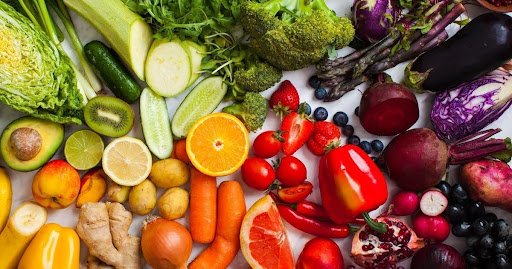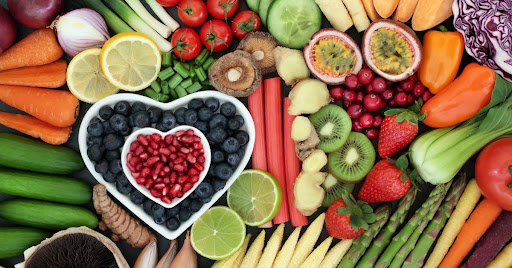Essential Vitamins Found in Fruits and Vegetables
7 min read
By DocGenie , Published on - 11 October 2024Vitamins are essential organic compounds, which our bodies need in small amounts to work properly. They play a crucial role in several bodily functions, including energy production and immune function. Unlike carbohydrates, proteins, and fats, vitamins do not give energy; however, they are quite essential for the conversion of food into energy. Since most of our bodies cannot produce most vitamins, they are acquired through a balanced diet that is full of fruits, vegetables, whole grains, and protein sources.
Key Roles of Vitamins
- Energy Production:
- B Vitamins: Vitamins B1, B2, B3, B5, B6, B12, and biotin are essential in the metabolic processes that transform food into energy. They assist enzymes in breaking down carbohydrates, fats, and proteins into usable forms.
- Vitamin C: Vitamin C is not directly used in the process of making energy. Vitamin C however, increases iron absorption. This improves the formation of red blood cells as well as oxygen supply to energy-generating tissue.
- Immune Function:
- Vitamin A: It strengthens the immune system by taking care of the mucous membranes which acts as an immunity shield against infection.
- Vitamin C: It supports the production of white blood cells responsible for combating diseases.
- Vitamin E:It acts as an antioxidant that prevents cell damage caused by free radicals.
- B Vitamins: It helps in a healthy immune system by promoting the production of antibodies and white blood cells.
- Cell Growth and Repair:
- Vitamin A: It is very important for cell differentiation and growth, especially in epithelial tissues.
- Vitamin C: It is important in the synthesis of collagen, which is a protein used to repair skin, bone, and connective tissues.
- Vitamin E:Preserves cell membranes from oxidative degradation.
- Folate: Facilitates DNA synthesis and cell division. It is important in the growth and development of new cells.
- Blood Clotting:
- Vitamin K: Activates proteins needed for blood clotting. This prevents excessive loss of blood.
- Bone Health:
- Vitamin D: Assists in the absorption of calcium from the gut. The absorption of calcium is required to build and maintain strong bones and teeth.
- Vitamin K: Activates proteins needed for bone mineralization. This ensures proper formation of the bone.
- Vision:
- Vitamin A: Aids in the development of rhodopsin, a pigment in the retina, enabling us to see even with low light.
- Nerve Function:
- Vitamin B12: Important for the maintenance of myelin sheath which wraps nerve fibers and aids the efficient transmission of impulses.
- Vitamin E: Helps shield nerve cells from oxidative degradation, thus ensuring nerve cell function.
Read Also: Vitamin B12 Cyanocobalamin Test
By understanding the vital roles of vitamins, we can make informed dietary choices to ensure our bodies receive the necessary nutrients for optimal health. A balanced diet rich in fruits, vegetables, whole grains, and lean proteins is the best way to meet your vitamin needs.
How Fruits and Vegetables Deliver Essential Vitamins
Fruits and vegetables are rich in a variety of vitamins and minerals. The colors of these foods often reflect the presence of certain vitamins.
List of vitamins in fruits and vegetables:

Vitamin A
Why it's important: Vitamin A is an essential nutrient for maintaining healthy vision, especially in low light. It is important for the development and function of the retina, the light-sensitive tissue at the back of the eye. Furthermore, it plays a great role in the immune system, supporting it to help in the production of white blood cells whose role is to try to defeat infections.Fruit and Vegetable Sources:
- Carrots
- Sweet potatoes
- Spinach
- Kale
- Cantaloupe
- Apricots
- Dark leafy greens
Deficiency: A deficiency in vitamin A can lead to a range of health problems, including:
- Night blindness: Difficulty seeing in dim light
- Dry eyes: Reduced tear production, leading to eye irritation and discomfort
- Increased susceptibility to infections: A weakened immune system can make individuals more vulnerable to respiratory and other infections
Vitamin C
Why it's important: Vitamin C is a great antioxidant that helps protect the cells from damage caused by harmful free radicals. Also, it plays a great role in the synthesis of collagen, which is essential for skin, bone, and connective tissue health. It also supports wound healing.Fruit and Vegetable Sources:
Deficiency: A deficiency in vitamin C can lead to scurvy, characterized by:
Vitamin E
Why it's important: Vitamin E is another antioxidant that reduces cellular damage caused by oxidation. The nutrient helps in protecting nerve cells. It regulates immunity through regulating inflammation.Fruit and Vegetable Sources:
Deficiency: A deficiency in vitamin E can lead to:
Vitamin K
Why it's important: Vitamin K is responsible for blood clotting and bone health. It helps activate proteins that cause blood clotting, thereby avoiding excessive bleeding.
Fruit and Vegetable Sources:
Deficiency: A deficiency in vitamin K can lead to:
Folate (Folic Acid)
Why it's important: Folate is a crucial nutrient for cell growth and development, especially during pregnancy. It helps prevent neural tube defects, such as spina bifida, in developing babies. Folate also plays a role in the production of red blood cells and the synthesis of DNA.
Fruit and Vegetable Sources:
Deficiency: A deficiency in folate can lead to:
Vitamin B Complex
Why it's important: B vitamins are a set of water-soluble vitamins that are crucial in energy metabolism, nerve functions, and in the production of red blood cells. They facilitate energy formation from food, support the functions of the brain, and promote healthy skin, hair, and nails.
Fruit and Vegetable Sources:
Deficiency: A deficiency in B vitamins can lead to various neurological disorders,anemia, and fatigue.
Vitamin D
Why it's important: Vitamin D is used in calcium absorption and bone health. It regulates calcium and phosphorus levels in the blood, which are crucial for strong bones and teeth. Vitamin D also helps in immune function and may even help prevent some types of cancer.
Fruit and Vegetable Sources: While vitamin D is not directly found in plant-based foods, exposure to sunlight is the primary way to produce vitamin D in the body. Some mushrooms, especially those exposed to UV light, can also contain vitamin D.
Other foods that include Vitamin D include:
Deficiency: A deficiency in vitamin - D can lead to:
Incorporating Fruits and Vegetables into Your Diet
Eat a colorful variety of fruits and vegetables daily . Here are some strategies to get you started on consuming more nutrient-rich food:
The Role of Telemedicine

By making appointments online with a registered dietitian or a general practitioner, you can can personalized advice on your diet, identify potential deficiencies, and get supplement recommendations.
By combining the power of telemedicine with a balanced diet rich in fruits and vegetables, you can take proactive steps to optimize your vitamin intake and improve your overall well-being.
You can consult our doctors.
Author Details

Dr.Rachna Kucheria
MD (Community Medicine) AIIMS New Delhi
MD (Family Medicine) USC California
Obesity Medicine Certification The American Board of Obesity Medicine
30+ Years of experience


